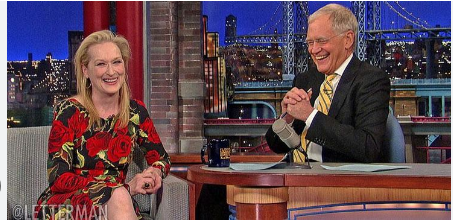Millions of people are familiar with the name David Letterman. His humor, irony and offbeat comedies made him an icon in the late-night television. He transformed the nature of a talk show over the decades. In this paper, we will get to tour his life, career and legacy in simple easy to understand language. You will find out how David Letterman has impacted the TV, and what he is doing at the moment.
We will start by the beginning of his career, go through his ascendancy, his significant performances, his post-normal hosting projects and what is unique about his style. We will also examine the way people remember him nowadays. At the conclusion, you will have the complete view of the person behind David Letterman and his contribution to the present day media.
Who Is David Letterman?
Early Life and Education David Michael Letterman was born on April 12,1947 in Indianapolis, Indiana.
His father, Harry Letterman, was a florist and his mother, Dorothy (later Dorothy Mengering) was a secretary of the church. He had two sisters. He was very playful and liked toys such as model cars when he was a child.
Letterman studied at Ball State University and graduated in the year 1969 with his degree in telecommunications.
His first media attempts included early attempts at Indianapolis where he worked as a weatherman and radio broadcaster, but in these media jobs his sense of humor was already showing itself.
Real Name
Bio/Wiki
Age,Weight and Height
Next Steps and Goals
Popularity and its Reason
Girlfriend
Career
Networth
Nationality and Religion
Read More
Interesting Facts
David Letterman biography
| Field | Details |
|---|---|
| Full Name | David Michael Letterman |
| Date of Birth | April 12, 1947 |
| Place of Birth | Indianapolis, Indiana, USA |
| Nationality | American |
| Education | Ball State University (B.A. in Telecommunications, 1969) |
| Occupation | Television Host, Comedian, Writer, Producer |
| Years Active | 1970–present |
| Famous Shows | Late Night with David Letterman (1982–1993), The Late Show with David Letterman (1993–2015), My Next Guest Needs No Introduction (2018–present) |
| Production Company | Worldwide Pants, Inc. |
| Signature Segments | Top Ten List, Stupid Pet Tricks, Stupid Human Tricks |
| Spouse | Regina Lasko (m. 2009) |
| Children | One son, Harry Joseph Letterman (born 2003) |
| Notable Awards | Multiple Emmy Awards, Kennedy Center Honors (2012), Mark Twain Prize for American Humor (2017) |
| Major Health Issues | Heart bypass surgery (2000), tinnitus, past alcoholism |
| Net Worth (approx.) | $400 million (as of recent estimates) |
| Current Project | My Next Guest Needs No Introduction with David Letterman on Netflix |
| Legacy | Revolutionized late-night television with irony, self-deprecating humor, and unconventional comedy style |
The Story of Comedy and TV Early Days.
Letterman relocated to Los Angeles in 1975 and decided to become a comedian.
He played at The Comedy Store and started to write in the TV shows.
He has appeared on The Tonight Show Starring Johnny Carson several times, and eventually started to be a guest host. His first ventures of owning a show featured The David Letterman Show in 1980 but it did not last long.
These seed actions were preparations: comedy scripts, hosting a guest, experimenting with formats, things that would later aid him in creating a revolution in the late-night space.
Bio of Late Night with David Letterman.
Creation and Style Late night with David Letterman aired on NBC in 1982 giving Letterman his big break.
His style varied with the predecessors. He employed irony, self-knowing and strange humor. He brought on board segments that deviated form the traditional talk show format.
His signature bits would include:
- The Top Ten List
- Stupid Pet Tricks and Stupid Human Tricks.
- Crew humor, strange interactions with the audience and skits that appeared to be improvised.
Sarcasm, joking with people, and surprises were his constant techniques. There was both supporters and opponents of his approach.
Impact and Recognition
Late Night with David Letterman proved to be a hit by winning several Emmy Awards and becoming a success in the genre of talk shows (nica)
It was experimental, challenging the hosts that followed it to be experimental, absurdist, and willing to break the fourth wall.
The situation changed in 1992 when Johnny Carson declared his retirement. This created a change in late-night authority. Letterman had been expected to be the successor of Carson. Instead, NBC chose Jay Leno.
That move saw Letterman transfer to CBS in 1993.
Launch and Format
The Late Show with David Letterman was started in August 1993 on CBS.
He transferred numerous segments of Late Night, and introduced new ones. Disputes however erupted when NBC argued that some of the segments were their intellectual property.
The format of Letterman consisted of monologues, interviews with the guests, jokes, and performances. His band (under the leadership of Paul Shaffer) was actively involved.
Milestones and Challenges
2000 Emergency heart surgery He was taken to a bypass five times but came back to show later that year.
2005 Kidnapping plan A plan to kidnap his son Harry was aborted.
2012 30 years in late night He celebrated thirty years as a host.
Retirement announced In 2014, he announced that he would retire in 2015.
2015 Final show He exited Late Show in May 2015.
In his tenure at CBS, he has been able to win awards, accommodate the changing media, and be relevant despite changes in the television scene.
The Late Show has had a long time director; Jerry Foley had been leading the show since 1995. The house band of the show, under the direction of Paul Shaffer, was operating since 1982 up to 2015, serving both NBC and CBS.
Around-the-World Pants and Backstage.
Letterman established a production firm known as Worldwide Pants.
This firm made programs such as Everybody Loves Raymond and owned an archival footage library.
Worldwide Pants did not close down immediately after his retirement in 2015, but instead did selective projects, in part assisting his Netflix series.
To a large extent, the behind-the-scenes power was through his writers and producers. Merrill Markoe is credited with the assistance in formulating the tone and parts such as Stupid Pet Tricks.
Life After Late Night Hosting.
By the time Letterman had to walk out of his last Late Show in May 2015, he made a legacy of innovation.
At the beginning, he remained largely beyond the limelight. Occasionally he appeared and participated in special projects.
In an interview with GQ in 2024, he disclosed that he returned to Indiana after quitting Hollywood to live more livingly, he feels more human than when he was in the business.
He has said things concerning the fact that show business required a persona and that getting out of the business allowed his real self to develop.
The same thing happens with Return with Netflix
Letterman came back to the screen in 2018 with a set of series with Netflix titled My Next Guest Needs No Introduction with David Letterman. It is a program consisting of long interviews with a single guest in each episode, usually not in a studio, and in informal or unusual locations. It has had several seasons and it was also recognized including Emmy nominations.
The latest one: In 2025, John Mulaney said that Letterman sent an Emmy to the father of Mulaney as a result of a special they had done together.
Also worthy of mention:
Letterman criticized CBS company on canceling the Late Show of Stephen Colbert because he said it was cowardly, and he justified the succession of his rival.
Samsung has also introduced Letterman TV, a 24/7 channel of his personal archival content, interviews and commentary which is available on Samsung TV Plus.
These demonstrate that despite his retirement as a host of the night show, David Letterman still influences cultural discourse.
Style, Influence, and Legacy
- What Made His Style Unique
- Self-referential and ironical jokes.
- Ready to make fun of himself, visitors and television shows.
- Unorthodox bits and spontaneous-feeling bits.
- Crew and staff used as humor element.
- Cynicism with celebrity culture and media standards.
Due to that style, he attracted the listeners who desired something less sophisticated and unpredictable.
The impact on Late Talk Shows.
Most contemporary shows and formats are inspired by the inventions of Letterman. For instance:
- Shots of ordinary people remotely.
- Viral stunts and pranks
- Combining solemn interviews with unsound ones.
- Less formal, more of a conversation.
As a comment, retrospectives frequently mention that the distant items and sarcastic elements that were new at the time have now become common in the late night shows.
Honors and Recognition
Throughout his career, Letterman was awarded several times:
Multiple Emmy Awards
Kennedy Center Honors in 2012
Mark Twain Prize in American Humor, 2017.
During several years he was rated as one of the best television stars.
Notable Works and Projects
The Late Night with David Letterman 1982-1993 He was the host and creative force behind it.
The Late Show with David Letterman1993-1994-2012-2013-2014-2015.His flagship series on CBS.
My Next Guest Needs No Introduction 2018-2018present NetFlix TALK show with extended interviews.
Worldwide Pants 1993–present (in different forms) His production firm of numerous media projects.
Other Projects
Dying to Do Letterman is a documentary that follows a comedian who is attempting to live his dream of being on the show of Letterman.
Film footage of his performances has been licensed under free use, including on YouTube by Worldwide Pants.
He has also attended events and screenings in the public, including attending a documentary screening of John Candy in 2025.
Even when Letterman hosts days that are based at night, these projects demonstrate that he is not inactive in the field of media and in his life.
Honest Problems and Wellbeing
Letterman has talked of his struggle against alcoholism. He has claimed he has drunk himself blind till around 1981.
He also handles the tinnitus, which is an unending ringing or a noise in the ears.
One major health problem was his heart operation in 2000.
Relationships and Family
His first wife was his college sweetheart, Michelle Cook whom he married in 1968 and divorced in 1977.
He was later in a long relationship with Merrill Markoe between 1978 and 1988.
He has been married to Regina Lasko since 2009. They share a son, Harry, born in 2003.
In 2005, he lost a kidnapping attempt against his son. Fortunately it was stopped by the police.
Disputes and Social Response
We have had some tensions with networks or in parts whereby guests have been put off by the way he does it. At times his humor offended guests.
His recent outspoken critique against CBS on terminating The Late Show with Stephen Colbert attracted more publicity. He described it as a cowardice action and asked why the network did this.
These instances demonstrate that Letterman has not been afraid to speak out to his mind even years after bowing out of the nightly television.
Popular Perception and History.
Letterman is considered to be one of the most significant personalities in the history of late-night television. Hosts and critics cite his style as the basis of the modern talk show.
He has been sometimes called a cranky and idiosyncratic figure – one who was critical of celebrity and frequently self-satirizing. But it is that contrast which gave his work a certain voice.
Existing Projects and Public Voice
As of the recent years, the Netflix series My Next Guest Needs No Introduction is his primary active media appearance. He has also spoken louder on the media, but has criticized a decision that was made by the network and is talking about his own change in identity.
The establishment of the new network titled Letterman TV on Samsung TV Plus implies that the current size of the audience will have an opportunity to re-examine his work on a regular basis.
In the interviews, he tells that he wishes to live in a more real life, not under the strain and the image of show business. He refers to the myth of retirement where he says that human beings do not stop but simply rearrange their ways of engaging.
Summary
The career of David Letterman started in Indiana where he employed early humor in the local media, and became one of the most significant late-night hosts in the history of television. He has risked and combined irony, absurdism and interaction with the audience in a manner not many had ventured to. Late Night with David Letterman and The Late Show with David Letterman were his two huge programs that lasted decades, and changed the way viewers approached a talk show.
Conclusion
Back stage, his production company, Worldwide Pants, and his group of writers and producers played a key role towards his victory. There is a bit of frailty behind the facade as illustrated in his personal life, his health complications and his addiction. The fact that he has returned to the media with My Next Guest Needs No Introduction, and has also criticized the decisions made by networks, shows that he still has an impact on the field.
FAQs
1.What was the uniqueness of the style of David Letterman over the other late-night hosts?
He used irony, self mockery and unpredictable bits in a manner that defied the rules of a talk show. He put the crew and unconventional stunts in the limelight and challenged the conventions of the celebrity culture.
2.When did David Letterman quit being a night time TV host?
On May 20, 2015, he gave his last Late Show with David Letterman appearance.
3.What is My Next Guest Needs No Introduction with David Letterman?
It is a Netflix show which started in 2018 in which Letterman sits down with one guest seriously one episode, usually in a casual, off-studio atmosphere.
4.What has David Letterman done to the contemporary talk shows?
His remote stunts, ironic format breaks, conversational style and offbeat humor have influenced many future hosts. His readiness to break the rules demonstrated that the talk shows could be more artistic and uncommon.
5.Has David Letterman been publicly making any statements?
Yes. He condemned CBS to cancel the Late Show of Stephen Colbert and termed the move a cowardly move and he made a comeback to the world through Netflix and archival releases.



